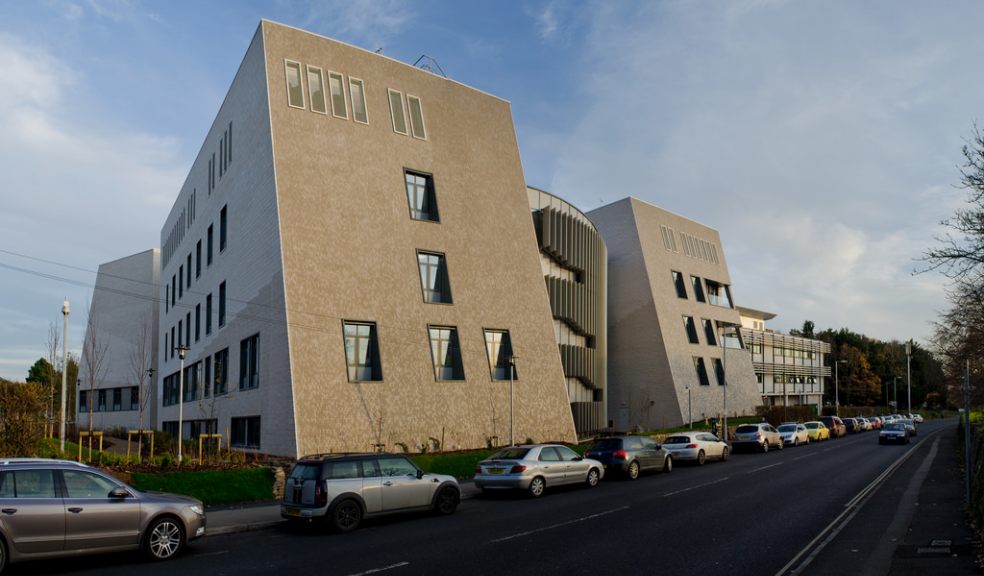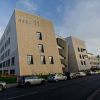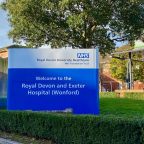
World Dementia Envoy opens Exeter health innovation hub
An award-winning centre which is cementing Exeter’s global reputation for health innovation has been officially opened by the World Dementia Envoy, Dennis Gillings, CBE, PhD.
The £27.5 million Research, Innovation, Learning and Development (RILD) building, on Exeter’s Barrack Road, embodies a pioneering partnership between the University of Exeter Medical School and the Royal Devon & Exeter NHS Foundation Trust (RD&E). It was officially launched on Monday (June 2), when nearly 200 VIP guests gathered at the centre of excellence for education and research.
The new development will promote a multi-professional approach to training and education, and will streamline the process from discovery to patient care. The building is innovative in every way – already, it has won a Michelmores and Western Morning News property award, in the category of project worth over £5 million.
Guests at the launch included Dr Jeremy Farrar, Director of The Wellcome Trust, and Sir David Weatherall, Trustee of the Wolfson Foundation, who jointly unveiled a plaque acknowledging the generous donation the two organisations made towards the award-winning £27.5 million building.
Dr Gillings, founder and Executive Chairman of Quintiles, the world's leading provider of biopharmaceutical services, is a University of Exeter alumnus who was named as World Dementia Envoy by David Cameron earlier this year. Dr Gillings said: “I’m delighted to launch this world-class centre, which has one ultimate goal in mind – to improve patient care. This partnership between the University and the RD&E encourages dialogue between academics and health professionals, to ensure research is addressing important clinical questions which are relevant to the needs of the NHS. This fresh approach is exactly the kind of innovation we need to tackle some of the greatest global health problems of our time, including dementia, diabetes and obesity.”
Professor Steve Smith, Vice-Chancellor of the University of Exeter, spoke at the event, and said: “We’re thrilled to welcome so many of our supporters to open this flagship building, which puts Exeter on the map as a centre of excellence for clinical research and patient care. The project will help attract more high-end jobs to the city, and will also improve healthcare, in the South West and across the world.”
Angela Pedder, Chief Executive of the RD&E, said: “The official opening of RILD is a very proud moment for the RD&E and our University partners. This superb new facility will help us to drive forward improvements to the care we give our patients and offer first-class training and educational opportunities for all of our staff.”
The launch comes as the quality of health-related science education at the University of Exeter is confirmed among the best in the country by the Guardian University Guide, with three related subjects ranked in the top ten. Medical Imaging was rated the best course of its kind in the country, while Biosciences, which includes the BSc in Medical Sciences, ranked 6th and Medicine 8th.
The new RILD facility is connected to the Medical School’s existing building, on the hospital site on Barrack Road. It encompasses the Postgraduate Education Centre, the Wellcome Wolfson Medical Research Centre and the National Institute for Health Research (NIHR) Exeter Clinical Research Facility. In addition, RILD has a strong focus on multi-professional learning and development. It incorporates modern clinical simulation facilities, where staff can re-enact lifelike scenarios. Its seminar rooms will be used by the Trust’s learning and development team to jointly train and educate a wide range of clinical and non-clinical staff.
Anyone can help support medical research by signing up to the Exeter 10,000 Project, called the Exeter 10,000 Project, involves collecting information and samples from 10,000 volunteers. This research register has already recruited more than 6,000 people and is enabling researchers to seek answers on some of the greatest healthcare issues facing society.
Volunteers get a free health check, their samples are analysed in laboratories directly opposite the wards, and the anonymised results are analysed by researchers in the building. Find out more at: www.exeter.crf.nihr.ac.uk














